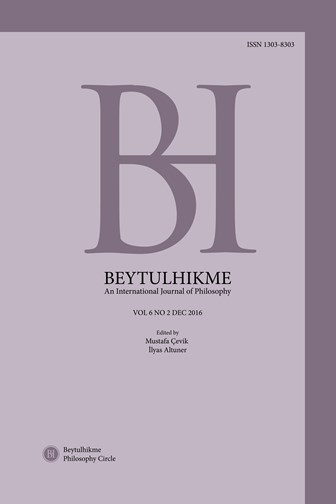Author :
Abstract
Bu makale otoritenin (siyasal erk ya da devlet) şiddet kullanma hakkından söz edilip edilemeyeceğini etik ve hukuk ile ilişkisi bağlamında incelemeyi ve otoritenin gerektiğinde güç kullanma yetkisinin meşru temellerini tartışmayı amaçlamaktadır. Tartışma, genel olarak, Toplumsal Sözleşme geleneğinin ve Doğal Hukuk öğretilerinin otorite, şiddet ve insan hakları kavrayışları çerçevesinde yürütülmüştür. Makale, temel olarak, otorite, şiddet ve insan hakları kavramlarının bağlamlarından kopuk bir şekilde ele alındığını ve bu nedenle de sorunların tespitinde ve çözümünde izlenen yolların beklenen ya da istenen sonuçları, etik ve hukuk arasında göz önünde bulundurulması gereken ayrımların dikkate alınmaması nedeniyle, ortaya çıkaramadığı iddiasını ileri sürmektedir.
Keywords
Abstract
In this article, the author intends to analyze whether one can talk about the Authorities' (political power's or State's) right to violence within the context of the ethical and legal relations, and to discuss the legal foundations of the authority's right to violence as required. The burden of the discussion is being carried out within the tradition of Social Contract and the doctrines of Natural Law. In this article, it is argued that the concepts of authority, violence and human rights, in general, are being discussed out of their relevant contexts, and as a result of this approach, especially when we ignore the distinctions between ethics and law, the expected or the desired results cannot be achieved.
Keywords
- Arendt, H. (1994). İnsanlık Durumu (çev. B. S. Şener). İstanbul: İletişim Yayınları.
- Arendt, H. (1997). Şiddet Üzerine (çev. B. Peker). İstanbul: İletişim Yayınları.
- Austin, J. (2001). The Province of Jurisprudence Determined (ed. W. E. Rumble). Cambridge: Cambridge University Press.
- Cherry, M. J. (2004). Natural Law and Moral Pluralism. Natural Law and the Possi- bility of A Global Ethics (ed. M. J. Cherry). Dordrecht: Kluwer Academic Publishers.
- Edmundson, W. A. (2004). An Introduction to Rights. Cambridge: Cambridge Uni- versity Press.
- Hobbes, T. (1991). Leviathan (ed. R. Tuck). Cambridge: Cambridge University Press.
- Kant, I. (1991). On the Relationship of Theory to Practice in Political Right. Political Writings (eds. R. Guess & Q. Skinner). Cambridge: Cambridge Uni
- Kant, I. (1999). Metaphysical Elements of Justice (trans. J. Ladd). Indianapolis: Hac- kett Publishing.
- Kelsen, H. (1973). Essays in Legal and Moral Philosophy (trans. P. Heat). Dordrecht: D. Reidel Publishing Company.
- Locke, J. (1954). Essays on the Laws of Nature (ed. W. von Leyden). Oxford: Claren- don Press.
- Locke, J. (2003). Two Treatises of Government and A Letter Concerning Toleration (ed. I. Shapiro). New York: Yale University Press.
- MacIntyre, A. C. (2007). After Virtue: A Study in Moral Theory. Notre Dame: Uni- versity of Notre Dame Press.
- Nozick, R. (1974). Anarchy, State, and Utopia. New York: Basic Books.
- Platon (1992). Devlet (çev. S. Eyüboğlu, M. A. Cimgöz). İstanbul: Remzi Kitabevi.
- Raz, J. (1996). Ethics in the Public Domain: Essays in the Morality of Law and Politics. New York: Oxford University Press.
- Rousseau, J.-J. (2002). The Social Contract and The First and The Second Discourses (ed. S. Dunn). New York: Yale University Press.
- Said, A. A. (1980). Human Rights in Islamic Perspectives. Human Rights: Cultural and Ideological Perspectives (eds. A. Pollis & P. Schwab). New York: Praeger.
- Schmitt, C. (1985). Political Theology: Four Chapters on the Concept of Sovereignty (trans. G. Schwab). New York: The MIT Press.
- Schmitt, C. (2007). The Concept of the Political. (trans. G. Schwab). Chicago: Uni- versity of Chicago Press.
- Sigmund, P. E. (1971). Natural Law in Political Thought. Massachusetts: Winthrop Publishers.
- Wolff, R. P. (1969). On Violence. Journal of Philosophy, 66 (19).





